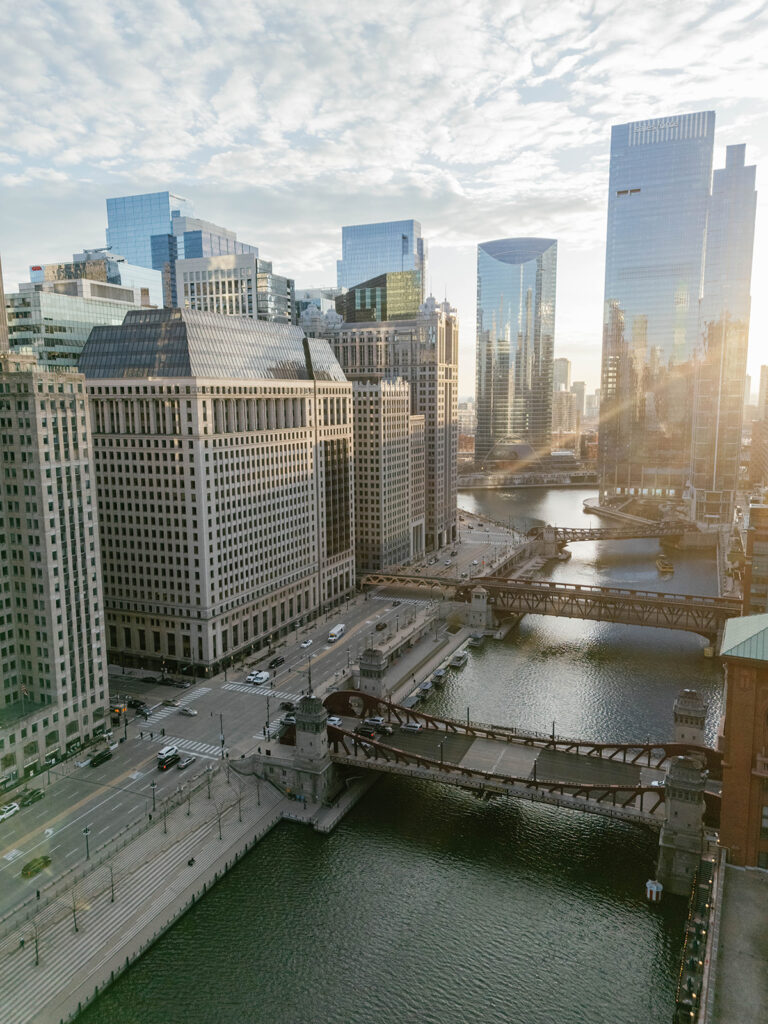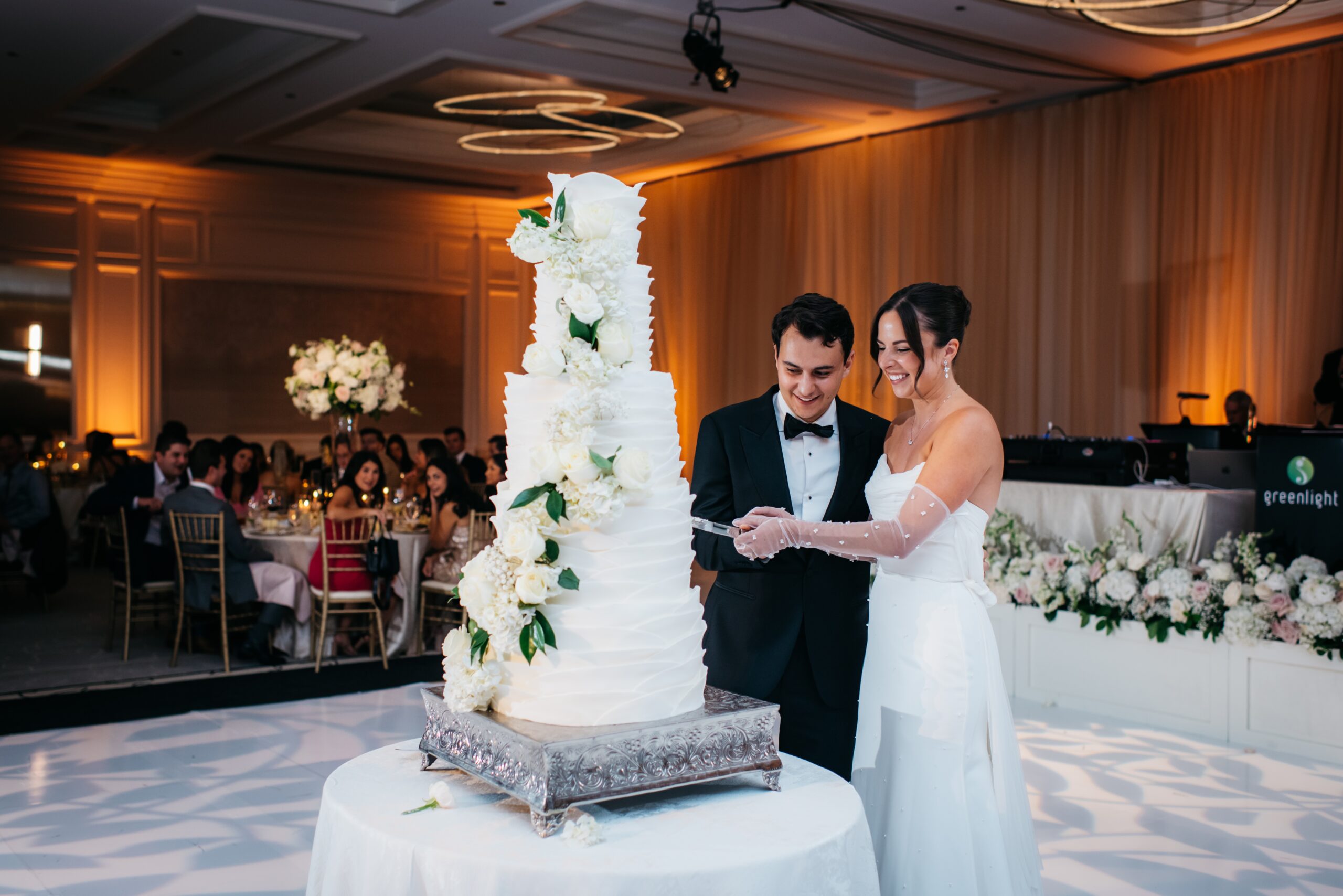What to Expect When Budgeting for Your Chicago Wedding
As a wedding planner in Chicago, nearly every couple I speak with about planning says something similar: it’s hard to find realistic education about what a wedding in Chicago costs. While we can’t make any promises about what your wedding will cost without becoming your planner and doing an in-depth assessment of your needs and priorities, there are a few pieces of advice we’ll give to anyone who asks: we believe it betters the entire industry and experience for couples to walk in with accurate information and eyes wide open to some basic principles of wedding budgets as they typically shake out for couples planning an event in Chicago.

The Bottom Line
It costs $60 to get married in Chicago. That’s the cost of a marriage license: everything else is optional. Now, if you’ve found yourself here, I’ll wager that you’re looking to host a celebration in honor of your marriage, which will cost a fair bit more than $60.
Exactly how much you spend beyond $60 boils down to two different things: your priorities and your expectations. Typically, our clients come to us with a certain expectation as to how their event will look or feel, or specifically where or when they host the celebration of their dreams. Our job as planners is not to promise them the world and deliver it at half the cost; our job is to ensure these expectations are aligned with a realistic budget. To us, “realistic” means that they find value in their spending, that vendors are charging fair rates for delivering excellent work, and that everyone involved has total transparency as to how the budget works for them.
That principle can scale both up and down the economic spectrum, and there is a way to celebrate thoughtfully at every price point. That said, for the types of event weekends our clients expect, it is challenging to achieve that vision at a budget of less than $900 per guest for a weekend’s celebration in downtown Chicago. To be completely candid, the majority of our clients end up spending between $1000 and $2000 per guest between all weekend events. Behind the scenes, we look at budgets in a “per guest” number, as so many costs scale directly with how many people are attending.
Quick Facts about Chicago Wedding Budgets
While we don’t allocate client budgets on a strictly percentage basis (more on that later!), there are a few fairly reliable rules for putting together your wedding budget in Chicago. Please note, we are specifically talking about downtown weddings at existing venues: if you’re at a private property, building a tent or other custom structure, please get in touch and we can chat more about where these expectations should land.
Venue, Food & Beverage: The all-in cost of your venue, food and beverage (this may be one to three different vendors) should be approximately 40% of your celebration budget as a whole. Too often, we hear of couples being “venue poor”, meaning they’ve over-allocated their budget to these line items and are left feeling like there is not enough to achieve the vision for the rest of the event. Plan for 40% as a starting point, and you should feel comfortable.
Planning: Reserve 10-15% of your budget for planning, to ensure you have a professional eye on the complex logistics of city events and can fully enjoy your event weekend. If that figure will land below $10,000, then event coordination or “partial” planning services may be the best fit for your event, and you should plan on taking a more proactive role in your planning process. Full-service planners will also include design services and charge accordingly based on the scope of your event. (To learn more about the full-service planner relationship, we have another post here!)
Taxes: As of the time of writing (mid-2025), Chicago has a few different tax rates that apply to different facets of the event. The good news? There is no tax currently levied on services: your planner, photographer, videographer, hair and makeup artists, to name a few, should not charge taxes on their invoice for services. Otherwise, rental and sales taxes can vary from 9.00% to 11.75%, depending on the item and location in the city. Hotel stays are currently taxed at 17.40%.
Gratuity & Service Fees: Service fees as gratuity are commonly found in food and beverage and hair and makeup services, reflecting two fields (dining and salons) where tipping is expected in everyday life. Hotel or in-house catering service fees can range anywhere from 20 to 27%. For these types of vendors, always ask for an itemized total invoice before signing a contract. What begins as a $10 menu item may be a $13.67 total charge between taxes and service fees. This final total may or may not be worth it to you, but you can use it to work backwards regardless: if your catering budget is $60,000, you should be looking at a “menu price” of roughly $43,875 to stay in that range. (Then, further divide that by your guest count to get your “per person menu price” — that’s the maximum package cost you should look for.) Offsite caterers price differently, but that’s a longer topic for another day.
For hair and makeup, work similarly: assume a 20% gratuity (whether contracted as a service fee or not) and work backwards to determine how much you should spend on the service itself.
What About Everything Else?
Outside of what is listed above, we typically aren’t looking to allocate specific percentages of the budget for specific services: this is where your priorities will come into play, as you figure out what your ideal experience looks and feels like. (We recommend having several key conversations with your partner before you commit a single dollar for this very reason!). Generalized information allocating spending percentages across the board can be more confusing than helpful, as these sources will never account for your specific needs or local market considerations.
For our clients, we use our expertise to parse through what we know about their vision and overall spending goals to create a customized event budget from the ground up. Once approved, we recommend vetted vendors reflecting those target goals, saving them the time-consuming step of figuring out what realistic costs might be: just one of the many ways we bring peace of mind as full-service wedding planners.
That said, there are a few places couples often get tripped up when determining the rest of their budget:
Account for minimums & labor costs: When bringing in any rentals or decor, companies will often have internal minimums and labor costs on top of the rental price of each item. For tighter timelines, there may be a higher premium on delivery fees. Consider streamlining rentals to a few sources, or if you love the look of pieces from many different places, be prepared to allocate funds accordingly. (And engage a planner who can manage the layered logistics of many different rental sources: we’re not afraid to bust out the setup flow charts when warranted!) For floral specifically, expect labor to be a significant line item in your final total: it takes many hours to source and produce even the most minimalist design plan!
Photography and Videography should have equal budgets for equal services: Videography is still relatively new to the industry, and is sometimes seen as an afterthought when it comes to budgeting. If videography is a priority for you, we recommend budgeting an amount equal to your anticipated spend on photography. The only caveat: if you are looking for limited coverage or edits, or opting only for content creation, you may end up spending less on videography.
Beware of under-budgeting “casual” events: For welcome parties, afterparties, and other ancillary events, “casual” can describe the atmosphere, but it does not automatically mean it costs any less to host a full bar for three hours for 75 people. (Who wants their bartender doing their job “casually”?) In-demand venues with good service will be priced appropriately, and if you wish to fully host your guests (as most of our clients do) for the entire weekend, a good rule of thumb is to consider what a nice evening out at a bar or restaurant in a similar location might cost per person, and use that as a starting point.
So, where Do we Even Begin?
Most people aren’t familiar with the true cost of hosting a large-scale event, much less one in a large city, a five-star hotel, or a historic landmark. Above all else, we recommend bringing a professional’s eye in from day one, so you can gain the ability to forecast what the road ahead might look like. Even if your budget does not allow for a full-service planner, many professionals offer hourly “consulting” services, or at the very least, a candid opinion about your anticipated spending range on your initial inquiry.
We highly encourage couples to engage in these conversations with local professionals instead of relying on third-party aggregate advice: it’s nearly impossible to accurately assess a spending plan for downtown Chicago with data from a national average. When you schedule a call with us, we will always assess the feasibility of your ballpark budget, or suggest a baseline range based on the essentials of your guest count and other requirements: the very last thing we would ever want is an unhappy surprise down the road during such a happy time in your relationship.
Questions? Thoughts? Want to chat about your wedding? Send a note via our inquiry form and we promise to get back to you within one business day.
